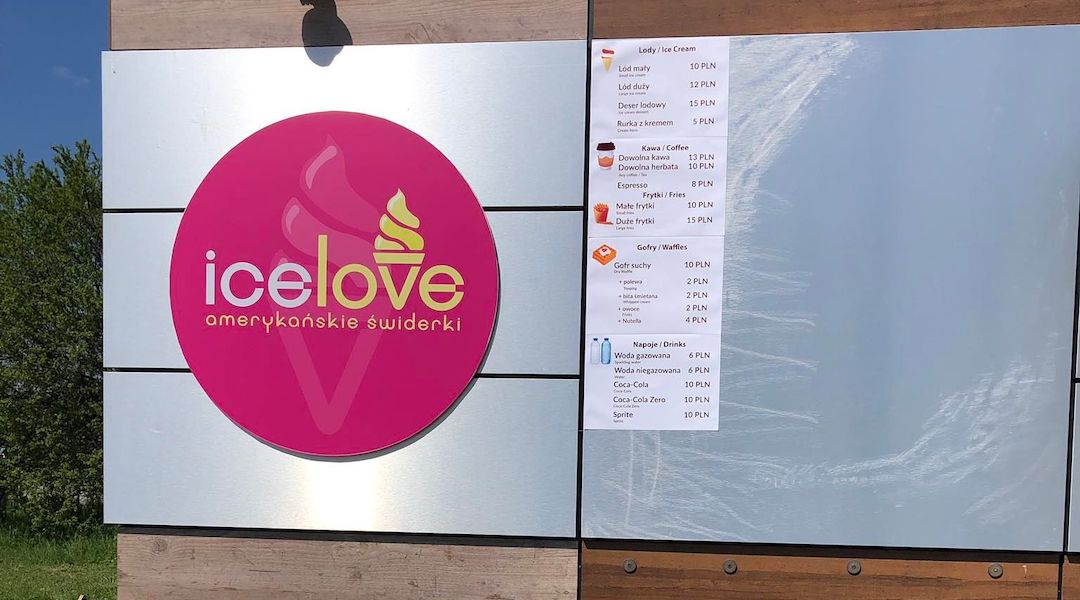Ice cream truck outside Auschwitz provokes criticism
A spokesman for the museum said the truck, which is just outside of the institution’s protected zone, is an example of “aesthetic tastelessness” and “disrespect”

An ice cream stand sits outside of the former Auschwitz camp in Oswiecim, Poland. (Dagmar Kopijasz of the Foundation of Memory Sites Near Auschwitz-Birkenau)
(JTA) — Barely 200 yards from the former Auschwitz-Birkenau death camp, visitors can now purchase ice cream, a fact that a spokesman for the museum called a sign of “disrespect.”
Since early May, an ice cream stand has sat some 200 meters (about 218 yards) from the camp’s red-brick “Death Gate,” where double rail tracks led directly to Nazi gas chambers. A photo of the stand circulated on social media this week, showing a kiosk with a pink logo reading “icelove,” along with signs advertising “ice cream” and “waffles” in Polish.
Paweł Sawicki, a spokesman for the Auschwitz-Birkenau Memorial and Museum, called the ice cream stand “an example not only of aesthetic tastelessness, but also of disrespect for a nearby special historical site.”
But the trailer has set up shop outside the boundaries of the memorial’s legally protected zone.
“Unfortunately we have no influence over it,” Sawicki told the Jewish Telegraphic Agency. “We trust that the relevant authorities will solve this embarrassing problem.”

(Dagmar Kopijasz of the Foundation of Memory Sites Near Auschwitz-Birkenau)
The largest Nazi extermination camp has been preserved in Brzezinka, outside the southern Polish town of Oświęcim, also known under German occupation as Auschwitz. At least 1.1 million people died at Auschwitz between 1940 and 1945, including about 1 million Jews. Some 83,000 Poles and about 21,000 Roma also perished at the camp.
The people living in Brzezinka know the history of their village well, said Dagmar Kopijasz of the locally based Foundation of Memory Sites Near Auschwitz-Birkenau. In 1941-42, the Germans completely displaced Brzezinka to create the camp zone.
“It’s obvious that the local residents are appalled by this ice cream stand and upset by the whole situation,” Kopijasz told the JTA. “Everyone says in one voice that this is no place to sell ice cream.”
Today the camp is a tourist hotspot, seeing more than 2 million visitors a year before COVID-19-related lockdowns. The Auschwitz Museum’s bylaws require visitors to “behave with due solemnity and respect,” adhering to a respectful dress code. They are not permitted to carry or eat food, talk on the phone or take photos in certain areas. The bylaws extend to speaking in any way that violates the memory of Auschwitz victims, denies Nazi crimes, defames the memorial site or encourages “hatred of any kind.”
Nonetheless, several tourists have come under fire for perceived misbehavior. Alabama teenager Breanna Mitchell was lambasted for posting a grinning selfie at the death camp in 2014. That same year, an Israeli Facebook page with a title translated as “With My Besties in Auschwitz” collected real social media posts of Israeli teens posing with humorous faces and peace signs at the camp, going viral overnight before it was taken down.
Temperatures for visitors waiting in line in the summer can get hot, and in 2015, the museum attempted to cool people off with sprinklers — which were quickly criticized by some who found them too similar to gas showers.
Holocaust-themed selfie scandals have flared up around other memorials, too. Israeli-German writer Shahak Shapira created a website called “Yolocaust” to shame self-indulgent selfie-takers at the Memorial to the Murdered Jews of Europe in Berlin, imposing their photos over historical images of the Holocaust.
Local authorities in Oświęcim are investigating the ice cream stand’s location, according to Notes From Poland. Municipality Mayor Andrzej Skrzypiński announced that it was set up on private property, based on a contract between the owner of the land and the owner of the kiosk. However, it’s still unclear whether the operation is allowed under the local zoning plan, which requires approval from the governor of the province.
This article originally appeared on JTA.org.















